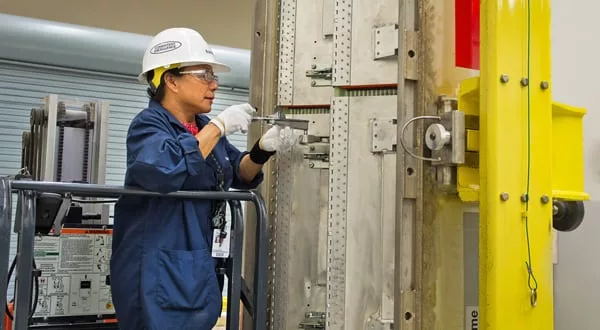
Home » Energy-saving rebates available to Richland businesses
Energy-saving rebates available to Richland businesses

July 16, 2018
Thanks to a partnership between the city of Richland and the Bonneville Power Association, commercial and industrial businesses within city limits are being rewarded for reducing their carbon footprint.
The energy efficiency program offered through Richland Energy Services works with 30 to 50 commercial and industrial customers a year. After providing a no-cost energy analysis to identify energy inefficiencies in areas such as lighting, heating and cooling, customers are encouraged to make improvements.
Financial rebates are based on kilowatt-hour savings and vary from project to project—and customers don’t have to do the updates all at once.
Framatome has been an active participant of the program for more than a decade, taking advantage of incentives, while reducing its energy consumption by 20 percent since its first project with the city and BPA. Improvements have included upgrading compressed air, building seals and insulation.
Senior Vice President Ron Land said the single biggest action Framatome has taken is upgrading the way it processes hydrogen gas through steam reformation. Framatome makes fuel for commercial nuclear reactors in the United States and the Pacific Rim and exports it as well. Although the plant is about 50 years old, Land said there are dozens of buildings on Richland’s 40-acre site, and each year the company aims to reduce its electrical consumption even more.
“Every year we have a plan. It’s broader than electricity (and includes) water, sewer and fossil fuels. Some projects we do on our own, and some we do through programs offered by the city and BPA,” Land said. “The (Richland Energy Services rebate) program has made us move faster to implement some of the improvements because with the financial incentive it makes the cost a little less on us. Obviously, we get a payback from the environmental perspective and a lower bill, but it helps with the decision making to push you along a little faster.”
The heating, ventilation and air conditioning system was another big project Framatome took on, putting variable speed drivers on some of its ventilation fans.
“After you get by the big few (projects), you get into a bunch of smaller projects,” Land said. “Obviously, it’s not the same plant it was 50 years ago, but we take the opportunity to buy more efficient motors so when we do renew part of the plant, the processes become more energy efficient. We work very hard to reduce our environmental impact as much as possible. We’re quite green compared to other facilities in the world.”
Framatome’s electrical engineering supervisor, Matt Durst, said the company is also more conscientious about shutting equipment down when it’s not needed.
Framatome isn’t just updating old machines and lighting, it is also in the midst of building a new $20 million facility, and the company is putting energy efficiency at the forefront of the project.
“We did partner with the city on that building. They were involved in giving us feedback. Going into it, we wanted to make sure we were getting a good level of energy efficiency. We’re replacing a very old facility on site that does much the same work, but it’s old and tired. I’m sure it wasn’t designed with energy efficiency in mind,” said Durst, who encourages other businesses to look into the city’s program. “The dams on the Columbia River are old too, and it’s a lot more cost effective to save electricity than produce more hydro generation or produce more gas-fired plants. Anything we can do to help save is a win-win for everyone.”
To qualify for energy rebate incentives, commercial or industrial businesses must be served by Richland Energy Services. Lighting incentives cannot exceed 70 percent of the total project cost and the project must show at least a 30 percent wattage reduction. Pre-installation inspection/reviews must be conducted by a city representative, and installed materials must meet or exceed specifications for installation.
City of Richland Energy Specialist Dawn Senger said light sensors and timers are easy ways to make improvements, as well as installing programmable thermostats.
Durst acknowledged that simple changes can add up to big savings, and he’s incorporated some of the energy-saving updates he’s seen at work into his home life.
“Personally, I switched to LED lighting. They last a lot longer and they’ve gotten to be better quality lights,” said Durst, who went on to say, “I’ve noticed a decrease in my bill.”
Along with commercial and industrial rebate programs, the city of Richland also offers rebates and low-interest loans to qualified residential customers for energy efficient HVAC equipment and weatherization measures, including insulation, windows and doors. Information and applications for rebate programs for businesses and residential customers can be found on the city’s website at ci.richland.wa.us/departments/energy-services/energy-efficiency-programs.
A list of energy-saving tips also can be found online, as well as an energy-saving lighting guide and ways to save money with holiday lights.
Local News Energy
KEYWORDS july 2018





